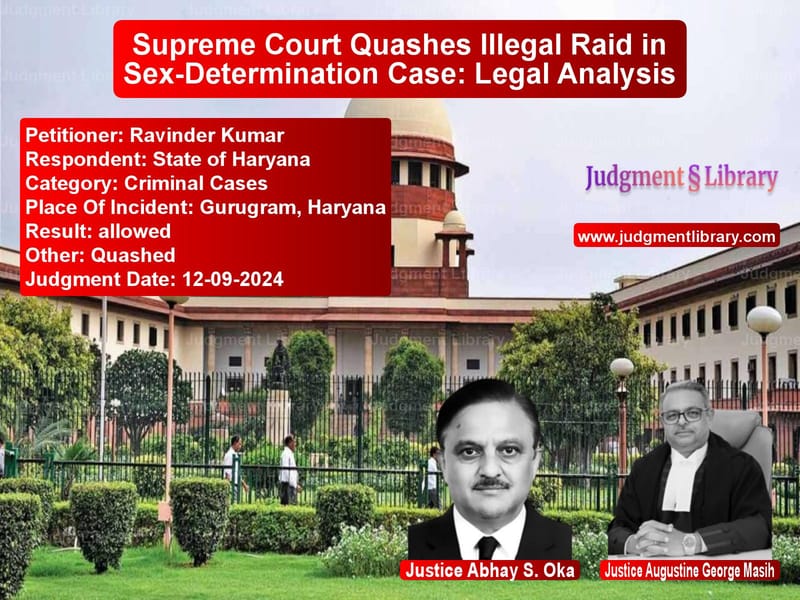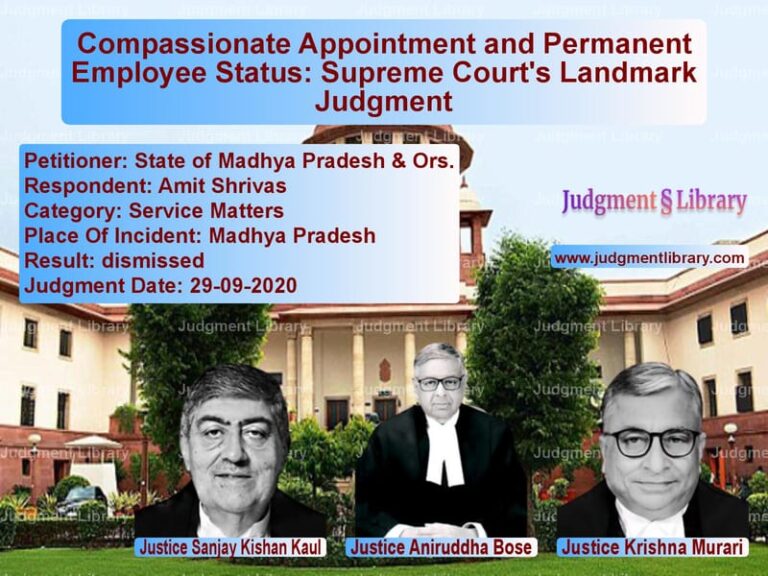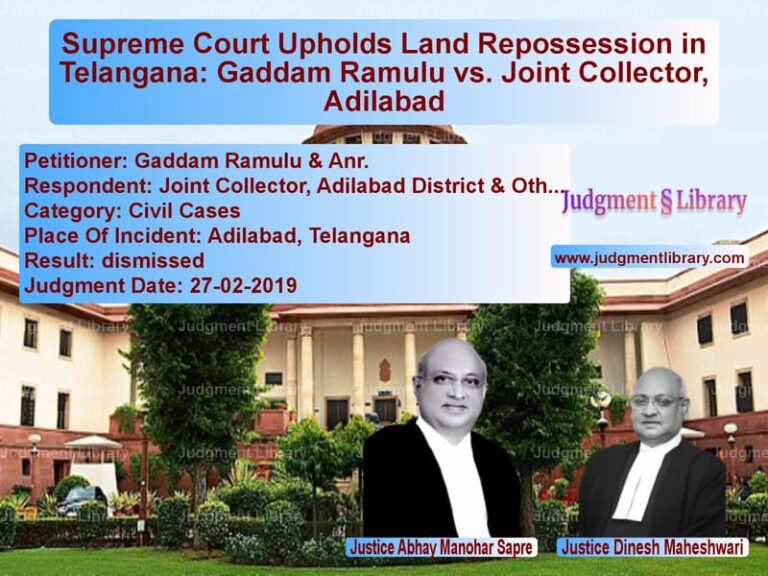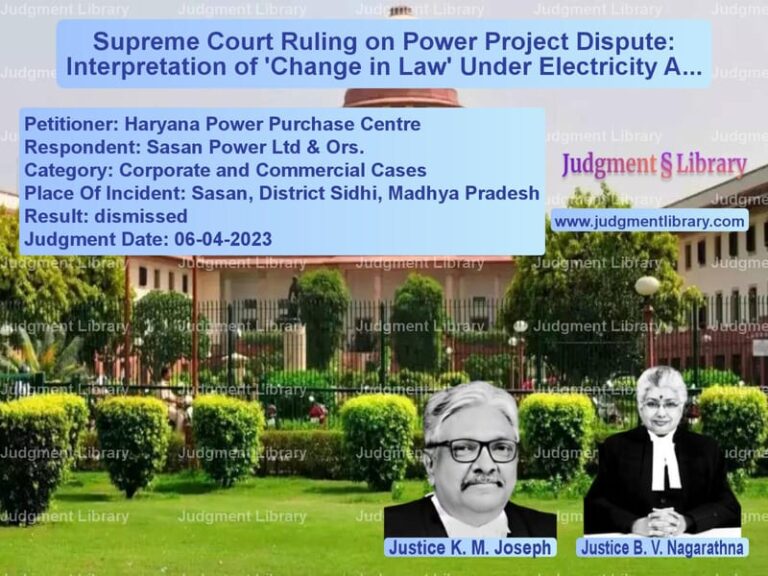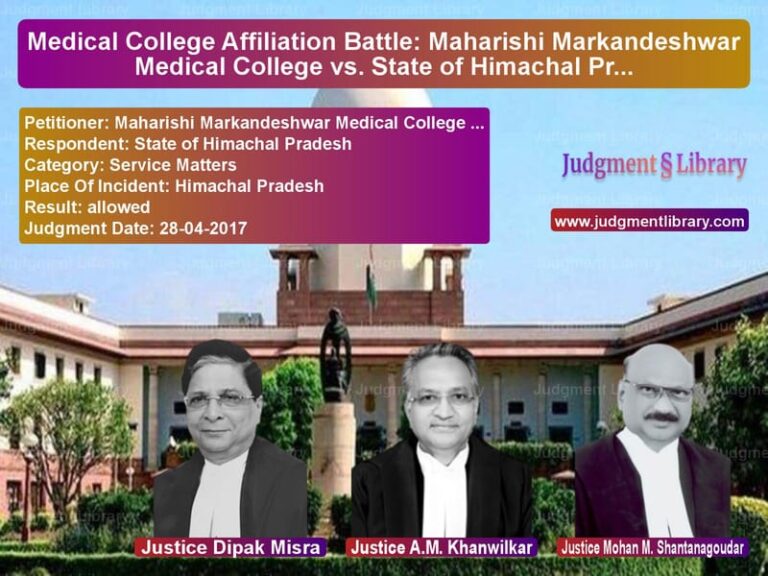Supreme Court Quashes Illegal Raid in Sex-Determination Case: Legal Analysis
The case of Ravinder Kumar vs. State of Haryana is a landmark ruling where the Supreme Court quashed an FIR and complaint filed under the Pre-Conception and Pre-Natal Diagnostic Techniques (PCPNDT) Act, 1994, due to an illegal raid. The judgment provides clarity on the procedural requirements for conducting searches and filing complaints under the PCPNDT Act.
The ruling highlights the necessity of ensuring that legal procedures are strictly followed to prevent wrongful prosecution and uphold the integrity of the judicial process.
Background of the Case
The appellant, Dr. Ravinder Kumar, a practicing radiologist, was accused of conducting illegal prenatal sex-determination tests. The allegations emerged after a sting operation led by the district authorities of Gurugram on April 27, 2017.
The prosecution alleged that:
- A decoy patient was used to expose an illegal racket run by a woman named Dhanpati (Accused No. 1).
- The decoy patient was promised a sex-determination test for Rs. 15,000.
- The decoy patient was taken to the appellant’s diagnostic center, Divine Diagnostic Centre, Gurugram, where an ultrasound was conducted.
- The police raided the clinic, recovered cash, and found an ultrasound report signed by the appellant.
- The FIR and complaint were registered under Section 23 of the PCPNDT Act, which criminalizes unauthorized prenatal sex determination.
Legal Arguments
Arguments by the Appellant (Dr. Ravinder Kumar)
- The raid was illegally authorized by only one member (Civil Surgeon) of the district’s Appropriate Authority, whereas the law mandates approval from all three members.
- The raid violated Section 30(1) of the PCPNDT Act, which requires the entire Appropriate Authority to believe that an offense has been committed before conducting a search.
- The seized evidence, including the ultrasound report, was illegally obtained and could not be used in prosecution.
- The entire case was based on the raid, and since the raid was procedurally flawed, the FIR and complaint were invalid.
Arguments by the Respondents (State of Haryana)
- The raid was necessary due to the urgent nature of the offense.
- The Civil Surgeon had sufficient authority to order the raid.
- The complaint was later filed by an officer authorized by the Appropriate Authority, curing any procedural defects.
- Even if the raid had procedural flaws, they were minor and did not affect the legality of the prosecution.
Supreme Court’s Observations
The Supreme Court examined whether the raid and subsequent prosecution complied with the procedural safeguards outlined in the PCPNDT Act.
1. Was the Raid Conducted Legally?
The Court emphasized that Section 30(1) of the PCPNDT Act only allows a raid if the entire Appropriate Authority has “reason to believe” that an offense has been committed. The Court held:
“The action of search is itself vitiated as it was authorized by a single member (Civil Surgeon) and not the entire Appropriate Authority, as mandated by law.”
Since the Civil Surgeon acted alone, the raid was deemed illegal and unauthorized.
2. Can Evidence from an Illegal Raid Be Used in Prosecution?
The Court ruled that the FIR and complaint were entirely based on the results of an illegal raid. Since the search was illegal, any evidence obtained from it was inadmissible.
3. Does a Subsequent Complaint Cure the Procedural Defect?
The respondents argued that the complaint was later authorized by the full Appropriate Authority, making it valid. However, the Court rejected this argument, stating:
“Once the foundation of the case (the raid) is deemed illegal, no subsequent action can rectify it.”
The Court concluded that an illegal search cannot be legitimized by filing a valid complaint later.
Final Verdict
The Supreme Court quashed the FIR and the complaint, ruling that the prosecution was invalid due to the illegal raid. The judgment reaffirmed that:
- The PCPNDT Act must be strictly followed in conducting searches and raids.
- Only the full Appropriate Authority can authorize a search.
- An illegal search cannot form the basis of a valid prosecution.
This ruling serves as a crucial precedent to prevent procedural abuse and protect individuals from wrongful prosecution under the PCPNDT Act.
Petitioner Name: Ravinder Kumar.Respondent Name: State of Haryana.Judgment By: Justice Abhay S. Oka, Justice Augustine George Masih.Place Of Incident: Gurugram, Haryana.Judgment Date: 12-09-2024.
Don’t miss out on the full details! Download the complete judgment in PDF format below and gain valuable insights instantly!
Download Judgment: ravinder-kumar-vs-state-of-haryana-supreme-court-of-india-judgment-dated-12-09-2024.pdf
Directly Download Judgment: Directly download this Judgment
See all petitions in Fraud and Forgery
See all petitions in Medical Malpractice
See all petitions in Contempt Of Court cases
See all petitions in Judgment by Abhay S. Oka
See all petitions in Judgment by Augustine George Masih
See all petitions in allowed
See all petitions in Quashed
See all petitions in supreme court of India judgments September 2024
See all petitions in 2024 judgments
See all posts in Criminal Cases Category
See all allowed petitions in Criminal Cases Category
See all Dismissed petitions in Criminal Cases Category
See all partially allowed petitions in Criminal Cases Category

